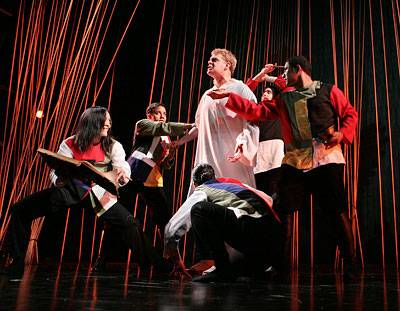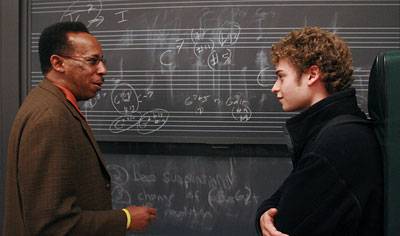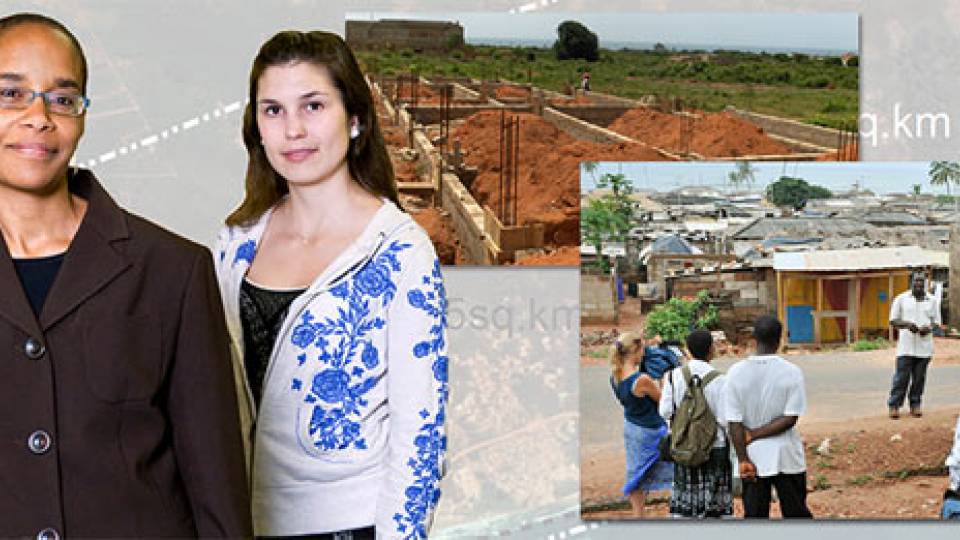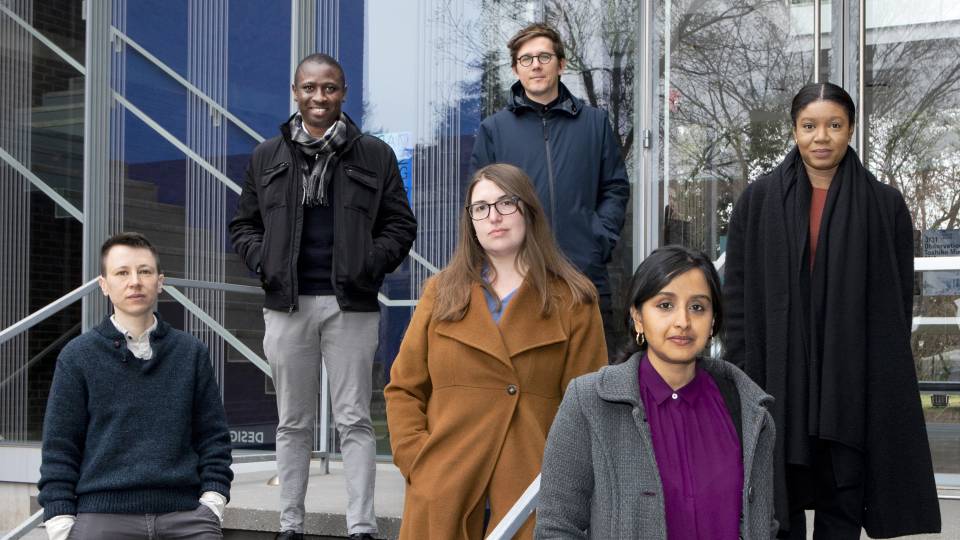From gender to jazz to extraterrestrial life, a slate of new and revised academic offerings available to Princeton students starting this year reflects the continued evolution of the University's curriculum.
As of Feb. 1, the Program in the Study of Women and Gender has changed its name to the Program in Gender and Sexuality Studies to signify the changing focus of scholarship in the field. In addition, the 2010-11 academic year marked the start of four interdisciplinary undergraduate certificate programs -- which allow students to supplement their work in their departmental concentrations with focused study in another area -- in information technology and society, jazz studies, planets and life, and values and public life. Since 2001-02, the University has added 11 interdisciplinary programs, renamed two departments and four programs, and split one program into two separate ones.
With regard to graduate study during this period, the University has made changes to its offerings at all levels -- doctoral, master, joint and dual degrees. The University also has added four graduate interdepartmental programs (which do not grant degrees but allow students to supplement their work in their doctoral programs with concentrated study in another area), discontinued four interdepartmental programs, added two graduate certificates (which recognize special expertise) and renamed two doctoral programs.
These changes reflect the evolution of the disciplines and the research interests of Princeton's faculty members. As faculty come to the University and explore new research areas, and as new knowledge is discovered, the departments and programs adapt in turn. The new degrees and programs provide students with the opportunity to learn from professors at the cutting edge of research and knowledge, and give students more options in selecting their areas of academic focus.

For nearly 40 years, the Program in Theater and Dance put on elaborate productions such as the 2007 world premiere production of "Boris Godunov," which included 13 student actors, with Andy Brown (center, in white) playing Boris Godunov, and 12 student dancers. In 2009, the program divided in two to reflect the growing student interest in dance. (Photo by Denise Applewhite)
"Establishing new programs allows students to benefit from the intellectual strengths and interdisciplinary ties of our faculty," said Deputy Dean of the College Peter Quimby. "They provide a way to represent these research interests in the undergraduate curriculum, so that students can pursue well organized, concentrated studies in those areas."
The creation of interdisciplinary and interdepartmental programs formally recognizes and organizes work that already is being done in academic settings, and it helps create new intellectual communities, Quimby said. No new faculty members are hired when certificate programs are created, but the programs are a reflection of the desire of the faculty to work across departmental boundaries.
"Take, for example, the Program in Translation and Intercultural Communication," he said, referring to an undergraduate certificate program established in 2007. "Faculty members and students certainly were doing everything from translating works from one language to another, to figuring out how to communicate across cultural boundaries. But the new program emphasizes the commonalities in these experiences -- that, for example, people from the Lewis Center for the Arts and comparative literature and physics were thinking about these kinds of issues together."
New programs advance interdisciplinary work
The four new certificate programs give shape to the interdisciplinary work already being done at the University, and students have shown strong interest in the programs. While the jazz studies program has not begun formally accepting students, the three other programs established this academic year have admitted an average of 15 students.
The Program in Information Technology and Society marries the technological and societal concerns involved in developing and deploying technology, said Sharad Malik, the program's acting director and the George Van Ness Lothrop Professor in Engineering. Professors in engineering, history, sociology and the Woodrow Wilson School of Public and International Affairs created the program's core course "Technology and Society" last year to provide a common foundation for students.

The new Program in Information Technology and Society takes a broad look at the issues involved with developing and deploying technology. Professor of History Michael Gordin (above) teaches "Technology and Society," a foundational course created by professors in engineering and the social sciences. (Photo by Frank Wojciechowski)
"Technology does not develop in a vacuum; by virtue of its applied nature, it is shaped by the needs and desires of individuals and the societies in which they live," Malik said. "We expect this program to attract engineering students who have an interest in the societal application of their work, as well as humanities and social science students interested in seeking a technology education component that will help them understand and deal with technology in their lives and careers."
Computer science major Jennifer King was among the first students to apply for the certificate. When the Princeton senior looks around at her field she doesn't see a niche specialty; she sees one of the most powerful influences in society today, from the instant communication of Facebook and Twitter to the complexities of computer-driven financial markets.
"Coming from the perspective of a CS major, the certificate really underscores how interdisciplinary computer science is, and has to be, in our society today," King said.
A growing interest in jazz from students led to the creation of the Program in Jazz Studies, directed by Anthony D.J. Branker, the Anthony H.P. Lee '79 Senior Lecturer in Jazz Studies. The program offers a wide-ranging exploration of jazz, from theory, composition and performance to history and cultural context, along with a requirement that students develop an educational lecture or demonstration to be presented by a student-led jazz group at a local elementary or middle school.
"I wanted to develop a program that was indicative of our commitment to jazz education," Branker said. "It is my hope that the Program in Jazz Studies will provide our students with a wealth of artistic and intellectual experiences designed to develop their understanding and appreciation of the stylistic and cultural diversity that is inherent in jazz."

Since taking over as director of Princeton's jazz program in 1989, Anthony D.J. Branker has increased the music department's course offerings in jazz and expanded the University's jazz ensembles to allow students to perform a variety of styles. The creation of the Program in Jazz Studies in 2010, with Branker at the helm, continues that growth. Above, Branker talks with student Jonathan Scholl, a saxophonist who played in the Concert Jazz Ensemble. (Photo by Denise Applewhite)
The Program in Planets and Life draws upon astronomy, chemistry, geosciences, biology, engineering and planetary science, said program director Adam Burrows, an astrophysical sciences professor.
"The studies of the origin of life in the astronomical and planetary contexts have emerged recently not only to become scientifically credible, but intellectually fascinating," Burrows said. "The certificate program was created in response to strong student interest in the associated fundamental questions and to tap … the excitement among the numerous Princeton faculty engaged in cutting-edge research on origin-of-life issues."
In the case of the Program in Values and Public Life, faculty members who studied moral and political philosophy wanted to gather the resources spread across departments, such as faculty, courses and research grants. The program also makes the resources of the University Center for Human Values, which sponsors the program, more accessible to undergraduates, and it provides informal learning opportunities, for example by organizing discussions this year with practitioners from the World Bank and Human Rights Watch, said program director Melissa Lane.
"The program offers focused pathways through the curriculum that will enable undergraduates to supplement work in their major departments with a systematic and coherent values-oriented component," said Lane, also a professor of politics. "The certificate has attracted considerable undergraduate interest in its first academic year … with [students'] interests focused on topics as diverse as bioethics, ethics and economics, constitutionalism, and religion and society."

The Program in Global Health and Health Policy, established in 2008, requires students to get hands-on training through a health-related summer research project or internship. Certificate student Ashley Schoettle's research on malaria prevention policy took her to Ghana; in a small village in the Hohoe district, shown here, Schoettle and a translator explained the importance of using malaria prevention techniques for pregnant women and children. (Photo courtesy of Ashley Schoettle)
Some programs reflect evolving societal issues
Among other new programs, the University also has added an undergraduate certificate Program in Global Health and Health Policy that allows students to study patterns of disease across societies, as well as the role of interventions in health improvements and the various social factors that shape public health. In addition, a new certificate in: Latino studies allows students to focus on the transformation and consolidation of Latinos as a pan-ethnic group; sustainable energy helps students understand energy resources and changes in the global climate; and urban studies prompts undergraduates to explore metropolitan regions and the cultural, political and economic evolutions in their landscapes (see sidebar).
Changes in research interests drive changes at the graduate level as well, said Graduate School Associate Dean for Academic Affairs David Redman.
The goal, he said, is "to accommodate new research areas of faculty" and "new research areas that students want to be instructed in." The challenge is "both to continue to offer standard courses that faculty teach in their specialty, but also to have flexibility to add courses as people's research interests change" or as new disciplines emerge, Redman said.
For example, most recently the University has added a doctoral Program in Quantitative and Computational Biology, an innovative, multidisciplinary field that reflects modern biology's growing reliance on the more quantitative sciences and computation. And students can now pursue a Ph.D. in neuroscience without a corresponding degree in biology or psychology, reflecting the growing prominence of the field and Princeton's investment in pathbreaking research with the formation of the Princeton Neuroscience Institute.

Princeton's investments in neuroscience have included an independent neuroscience Ph.D. program to go along with physical assets such as the magnetic resonance imaging (MRI) scanner above and a new neuroscience building. Above, Christopher Moore (foreground), a graduate student in psychology, and postdoctoral researcher Per Sederberg prepare to scan a test subject. (Photo by Denise Applewhite)
Meanwhile, departmental name changes have reflected shifts in focus in the respective departments. The Department of Chemical Engineering is now the Department of Chemical and Biological Engineering, based on the growing intersections of biology and engineering, as a third of the department's faculty focus on questions related to biology in their research; and the Department of Germanic Languages and Literatures is now the Department of German, with a broader focus including media studies, the visual arts and modern cultural studies generally.
The Program in Gender and Sexuality Studies, which offers both graduate and undergraduate certificates, sought its name change due to developments in the field. In the 1990s, said program director Jill Dolan, scholars began to make more distinctions between gender and sex, while also examining a broader range of gender and sexual identities.
"The name change to gender and sexuality studies allows the program to reflect the ever-evolving focus of this dynamic field," said Dolan, Princeton's Annan Professor of English and professor of theater. "As an intellectual project that's attuned to the social movements from which it springs, gender and sexuality studies here at Princeton will continue to honor its history in women's studies through our courses, our programming and our scholarship, while broadening our scope to include gender and sexuality writ large."
Founded in 1981 mainly as an undergraduate program, it was initially called the Program in Women's Studies, renamed the Program in the Study of Women and Gender in 1999, and expanded in 2006 to offer a graduate course of study and graduate certificate. The recent name change continues its evolution. The program also is growing in size, with its faculty roster, comprised of an executive committee and associated faculty, growing from 29 in 2008-09 to 44 in 2010-11, adding professors from the philosophy, economics and molecular biology departments.
The number of courses offered by the program or cross-listed with another program has grown from 19 to 30 in the same period, with additions such as "Women in Politics, Media and Contemporary U.S.," "Inequality: Class, Race and Gender" and "Gender and Development in the Americas."
In addition to gender and sexuality studies, the University has recognized new graduate-level interdepartmental programs over the last decade in health and health policy (which also offers a certificate), quantitative and computational biology and renaissance studies. Social policy has become an active and attractive joint Ph.D. program involving the Wilson School, the Program in Population Studies and the departments of politics, sociology and psychology. This spring, the Center for African American Studies added a graduate certificate through their interdepartmental program. These additions have allowed students to concentrate their doctoral studies in areas where a core community of scholars has arisen to support the students' work.
Departments and programs continue to make curricular changes regarding courses also. Some social science and natural science departments recently have created methodology courses or core courses to fill gaps in the curriculum. In the general area of professional development, the University has introduced writing courses for science and engineering students and ethics courses for natural science, social science and engineering students. And with faculty members' assistance, students are able to suggest and initiate courses, such as recent courses in public education reform and environmental entrepreneurship.
Finding ways to deepen intellectual connections among faculty members and engage students will continue to be a driving force in developing new academic programs, Quimby noted.
"Certificate programs come about because faculty members are working in an area where they see interdisciplinary connections that would be engaging to students," he said. "They work with our office to make those things come to life."
Writer Steven Schultz contributed to this story.




